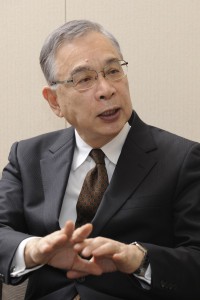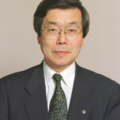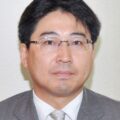Special Feature — Win with Diplomacy! The Art of War for a Country that Cannot FightStrategic Ambiguity and a Two-Pronged Approach to China
How would one deal with an irritable neighbor? A former ambassador to China, who was closely in touch with people of China for four years, unlocks the mystery of their thought processes and mentality.
“Know the enemy and know yourself”

MIYAMOTO Yuji
Former Ambassador to China, Chairman of the Miyamoto Institute of Asian Research
China’s economic development has been remarkable. Its nominal GDP was merely a quarter that of Japan in 2000, and yet it overtook Japan in 2010. It achieved a five-fold increase in ten years. The size of China’s economy reached 8.2270 trillion dollars in 2012, leaving Japan’s 5.9640-trillion-yen economy nearly 40 percent behind. Xi Jiping’s Chinese Communist Party has publicly committed to double the 2010 GDP in 2020 in real terms.
If the Japanese economy does not grow, the economy will be half that of China’s in 2020. Growth in China’s military expenditures has been exceptional as well. The Stockholm International Peace Research Institute (SIPRI) estimates China’s national defense spending to have totaled 129.2 billion dollars in 2011. The publicly disclosed figure is 93 billion dollars, and even this amount is more than 60 percent beyond that of Japan’s national defense outlays of 54.5 billion dollars (4.3623 trillion yen). Japan was overtaken by China in national defense spending in 2006, and one can clearly see that the distance between the two has been growing.
As such, it appears as if the gap between Japan’s national strength and that of China is only widening. There have been projections that point to China’s economy or military spending surpassing the U.S. equivalents. Still, there is no need to panic here, as extrapolations based on current trends are usually incorrect. That caveat aside, it would be safe to assume that a more self-assertive and stronger China will emerge.
So going forward, how should Japan exist in a relationship with China? To state the conclusion first, the path Japan should take is a two-pronged approach toward China. On the one hand, let China know that Japan relies on it for strength, and this would be a way to take out an insurance policy on the possibility of Chinese hegemony. On the other hand, Japan should create a safe and secure international environment through diplomacy. As a first step, Japan should utilize dialogue to let conditions simmer down and stabilize.
Regarding the problem surrounding the Senkaku Islands, in order for both sides to save face, Japan should come up with a political resolution that would not render either side a winner or loser. This means that it should be settled by exercising strategic ambiguity. At the time of the first Abe Cabinet in 2006 to 2007, strategic ambiguity that did not clarify whether the prime minister would visit or not was the very reason why a visit to the Yasukuni Shrine was able to stay off the radar as a point of contention in diplomacy.
Next, it is necessary to create a secure environment around Japan through the power of diplomacy. With economic globalization advancing to the levels seen today, Japan has no choice but to peacefully co-exist with China. Both sides would be destroyed if they were to engage in conflict. But is this possible with China, which is gaining power while retaining its respect and pride in its nation and ethnic groups? The answer is found in engaging in diplomacy designed to counter China. In other words, it means Japan must thoroughly understand China itself, to discover that there is an extreme sense of mutual misunderstanding as well as a lack of understanding, and then subsequently conceive a diplomatic style that is based on promoting Japan’s national interest over the medium to long terms.
Put it another way, in the words of Sun Tzu, “If you know the enemy and know yourself, you need not fear the result of a hundred battles.”
The mentality of the weak
Looking back at China’s modern history, it is possible to understand China’s ardent desire to become a great power in the world, yet again, by winning back its past glory. China’s modern history, which saw the country routed by the great powers, has become a trauma to the nation. This trauma is the main driving force behind China’s policies, which aim to make the country rich and powerful.
The Communist Party of China came to power by struggling and finally toppling the powerful Kuomintang. The new China was weak, and struggled to survive between the superpowers, the United States and the Soviet Union. This means that the Communist Party of China was in the shoes of a weakling for a long time. The Communist Party’s mentality as a weakling, which was formed in this way, and its pattern of activity will not disappear easily. We need to keep this in mind.
When the Tiananmen Square incident occurred in 1989 and the Soviet Union fell thereafter, Deng Xiaoping heightened his vigilance against U.S. hegemonism. The United States would contain China by exercising all types of maneuvers, cause the Communist Party to fracture and peacefully topple the communist regime. This theory of bringing down socialism by peaceful means is deeply rooted in the thought process of the Communist Party of China.
With the overlapping of this type of memory in the annals of history and vigilance that stems from ideology and geopolitics, among others, China, contrary to its superficial pronouncements, feels a strong sense of insecurity about the continuity of its own existence as well as its future. Of course, a great portion of this insecurity originates from the difficulty of managing its domestic affairs. The domestic problems that China faces are that numerous, large and serious. As such, it is critical to espouse nationalism that promotes unification of the country. Nationalism is often linked to a hardline stance on foreign policy. A hardline stance on foreign policy seeks reinforced military might, and thus bolstering military power would further buttress this hardline stance.
Such factors are what I see as the greatest reasons to catapult China to military power. There are problems involving Taiwan, the territories and securing resources. There is also the fact that many Chinese people simply think that China, as a world power, should possess military power befitting a powerful nation. More than this, though, this situation should be viewed such that the anxiety regarding the continuation of one’s country and the future are spurring China to take the path toward becoming a military power. It does not at all look as if China is full of confidence and is plotting to cross swords with the United States.
The background to this type of thinking is the basic recognition that the United States would pursue hegemony, while the rest of the world, even at this very moment, is exercising power politics, in which power rather than reason, wins. This nineteenth- and twentieth-century thought process is bringing about anxiety to the world.
China’s mentality, which does not let go of the past, is casting a wide shadow over its relationship with Japan. As a result of the Cultural Revolution that spanned over ten years, the authority and the popularity the Communist Party of China commanded over its people ceased to exist. The government’s moral compass collapsed. In 1978, Deng Xiaoping devised a plan to make China a rich and powerful country through policies of reform and openness. This was aimed at restoring the moral standing of the government and trust in the Communist Party. However, students and citizens, who were exasperated with China’s conditions at the time, spurred on the Tiananmen Square incident in 1989, and there were even some who spoke of overthrowing the Communist Party. Deng Xiaoping keenly felt the need to specifically have young people understand the Communist Party’s historic contributions. At that time, China’s leadership reinforced its teachings on patriotism as part of the curriculum that was developed for its education in history.
The objective of this teaching was to educate the country that China was humiliated because it was weak, and thus, the country had to get strong. And the Communist Party of China was what saved and strengthened this weak China. It was in no way squarely aimed at promoting anti-Japanese teachings, but one-third of the teaching materials cover Japan, and as a result, anti-Japanese sentiment built up.
According to Professor Ketsu Ryu of Waseda University, China’s loss against Japan in the Sino-Japanese war has had a greater impact on the Chinese people than their country’s loss against Great Britain in the Opium War, and so there was supposedly a consistent awareness of Japan’s presence in China’s desire to become a country with considerable presence and a great power (Chugoku no kyokou kousou: China’s plan to become a great power). This education on patriotism amplified anti-Japanese sentiment.
This is why when problems involving Japan arise, Chinese directly make a connection to history and immediately seethe with anger. Also, when hearing about Japan, they end up imagining militarism and hegemony.
I was appointed to a post in China in April 2006. This was a period when Sino-Japanese relations were rocky surrounding the issue of Prime Minister Koizumi’s visit to Yasukuni Shrine. China’s official view on this was that since first-rate war criminals are honored at Yasukuni Shrine, a prime minister or a major cabinet member of one country paying homage to them means that the government approves the country’s actions before the war and this in itself is unacceptable. There was a great divide between this recognition on the Chinese side and Prime Minister Koizumi’s understanding of history, which is, if anything, liberal. China’s anti-Japanese sentiment, which makes Japanese people uncomfortable, is affected by the lack of understanding of Japanese society and the thought processes of the nineteenth and twentiethcenturies.
China’s dream
Professor Masataka Kosaka wrote in a commentary in 1996 that “a major question for the twenty-first century is how China sees and positions itself,” brilliantly presaging the challenges of today. How China will determine its position in the world after conquering its trauma from history and what type of role it will seek to fulfill are great questions for the entire world. Is it a challenger of the existing world order or is it a supporter? To begin with, what kind of world is China trying to create? China must respond to these questions. And China must arrive at answers after it breaks away from its “thought process of the nineteenth and twentiethcenturies.”
Negative campaigns that China waged against Japan starting in September of last year were precisely these “thought processes of the nineteenth and twentiethcenturies.” There were more than a few editorial pieces that suggested “the eve of war.” If the Chinese leadership had ended up thinking this way and got dragged into it by the Chinese society, I would even doubt the future of East Asia.
This is because looking at it from a rational point of view, for China’s leadership, the only way to survive was to bring the international climate into order and develop the economy, but the fact that it did not take this path forced us to believe that the leadership can no longer control its domestic affairs. I feared another nightmare in the form of “China’s confusion.”
Looking back, one can perceive that the Xi Jinping structure, which was established at the eighteenth National Congress of the Communist Party of China in November last year, was a result of having undergone an extremely difficult transition of power that had withstood the test of time. Compared with Hu Jintao, who had been named as a future successor to Deng Xiaoping, the don, Xi Jinping’s authority was insufficient, as had been expected. Xi Jinping has thus been seeking to rapidly build authority. However, there is no mistaking that a confusion in China’s foreign relations had occurred in the process.
In August of this year, State Councilor Yang Jiechi, who is in charge of diplomacy, unveiled an essay in the Communist Party of China’s publication on political theories, Qiushi (“Innovations in China’s Diplomatic Theory and Practice Under New Conditions”), illustrating his party’s collective view today. Naturally, this had been approved by the Politburo’s Standing Committee. In the essay, he communicates that the party’s Central Committee has set the stage for it to be unified in directing and coordinating diplomacy by saying, “In the past six months, by strengthening institution-building, sorting out relevant systems and mechanisms, and formulating clear-cut regulations, the Party Central Committee has succeeded in improving the management of foreign-related work with stronger and better coordinated operations.”
Conversely, this means that there have been mutually contradictory comments and actions regarding foreign relations the past six months, and without a question, the state of affairs witnessed from the outside was quite abnormal. He meant to say that this was now unified.
Of course, this does not mean that everything will turn out fine and progress smoothly. Yang’s essay states that the basic diplomatic strategy of Xi Jiping’s administration is to be “committed to reform and opening-up, the path of peaceful development and the strategy of win-win cooperation with the outside world while resolutely upholding China’s core national interests.” This policy is consistent with what has been followed to date, and the implication here is the presence of a contradiction between China leading a path of international coordination, which is an economic necessity, and taking a hardline stance on foreign policy, that is, nationalism, which is necessary to stabilize the country. This means that we must assume that China will continue to display two different faces going forward.
Yang’s essay, indeed, touches on peace and international coordination a great deal. When Xi Jiping started his discourse on “China’s dream,” there were times such as when an officer of the People’s Liberation Army commented that this dream corresponds to China’s dream of becoming a great power or a nation with a powerful military. In his essay Yang says, “The Chinese dream is shared by the Chinese people of all ethnic groups and cherished by each and every individual in the country. The Chinese dream requires a peaceful and stable international and neighboring environment, and China is committed to realizing the dream through peaceful development.” The “dream of a powerful military” was set aside. But one cannot assert that this dream has disappeared.
Also, in the portion where he touches on neighborly relations with surrounding countries, Yang writes, “With respect to such issues as Diaoyu Island and the South China Sea, we have acted firmly to uphold our territorial sovereignty and maritime rights and interests while working hard to appropriately handle and resolve the disputes with the neighboring countries through dialogue and negotiation.” Here, he focuses on dialogue and negotiation. Also, in a separate paragraph, he says, “… we will endeavor to properly handle the differences and problems with relevant countries, while working to promote exchanges and cooperation in various fields to expand common interests, and maintain good relations with neighboring countries and peace and stability in the region as a whole.”
At the same time, Yang’s essay pays due consideration to nationalism. China’s diplomacy has a “bottom line,” and while the country will endeavor to work in an equitable direction, he also indicates that China will act by anticipating a worst-case scenario. In other words, he writes that “while firmly committed to peaceful development, we definitely must not forsake our legitimate interests or compromise our core national interests,” warning that a compromise by China, even a slight one, should not be expected.
As such, Yang’s essay is shifting the crux of the issue to international cooperation, while keeping the existing framework intact. The only thing that stands out here is that for the first time, the essay touches on taking the right approach on “justice” and “interests” in the context of China’s relations with neighboring and developing countries. This view on “justice” and “interests” is not only the essence of China’s outstanding traditional culture, the moral standard of the Chinese people and a rule for an individual’s worldly wisdom, he is also saying that it is a critical principle to uphold when approaching international relations. Justice is a sense of value that holds an especially important meaning in Chinese society. It signifies righteousness and also the nature of being good. It could refer to being reasonable or friendly.
In discussing China’s world view, great meaning can be found in the words “justice” and “interests.” This is because China is signaling the possibility of formulating a new type of world view. Sun Tzu talks about “valuing justice over interests” (Analects of Confucius, “Xian Wen”) and asks one to ponder whether profit matches justice. Another Confucian classic is the Da Xue, which notes that for “a state, pecuniary gain is not to be considered a prosperity, but its prosperity will be found in righteousness,” asking one not to consider personal gain as an interest, but aspire toward achieving interest from a broader context for the entire nation. In other words, this does not refer to China’s own interests, but to actions that center on pursuing the interests of the entire region.
To date, I have emphasized that China, as a civilization, must carefully think about the historical significance of its rise to power, establish a new world view for the current era and provide an explanation to the rest of the world. I have stressed that China should formulate this world view by holding a clear perspective on how the Chinese civilization would contribute to the world civilization.
The gist of this is that at this point China does not consider Europe and the Americas as part of this thinking. China could be praised for at least working on starting out a new form of diplomacy with its neighboring countries as well as developing nations founded in the traditional sense of values. Just as the term “socialist harmonious society” uttered by Hu Jintao has disappeared, this experiment could also suffer a setback.
Mutual misunderstanding and lack of understanding
In this way, China has yet to clearly identify its position or role and has not completed its self-portrait. It is still searching. This means that there is still time for the international society to call on China to become a powerful nation that is both constructive and responsible. Once China sets its mind on something, it cannot be easily reversed. But as long as it has not yet made its decision, there is still room to exert influence. Japan’s diplomacy should also be redesigned to get China constructively involved in generating development in East Asia, and by extension, the world order.
Some may say that it is too optimistic to expect China to fulfill such a constructive role, just because Yang Jiechi wrote a single essay. However, Yang’s essay has been approved by the Politburo’s Standing Committee. I have first-hand experience with the Chinese Communist Party, specifically its leadership’s steadfast persistence in upholding logic and higher principles. One example is the agreement reached in 2008 for joint development between Japan and China in the East China Sea. It has not made any headway, since there has been a rampant misperception of China having given up too much to Japan, but the agreement was reached despite the difficult negotiations precisely because of the trust that existed between Prime Minister Fukuda Yasuo and President Hu Jintao. This, in fact, was a result of the determination of both leaders to uphold justice as well as maintain the “strategic mutually beneficial relationship” agreed to by both parties.
There may be views that China’s response to the Senkaku Islands issue does not represent any logic or higher principles. However, logic and higher principles do exist on the Chinese side and this is what the Chinese leadership is fixated on. The problem is that the logic and higher principles are too vastly different from ours. This is a result of a chain reaction of mutual misunderstanding and lack of understanding. Of course, I do not mean to say that nobody has intentionally tried to use this to get a political edge. Certainly, there is evidence that it has been used in such a way. The essence of the problem is still the nature of the relationship of the two countries, which is a chain reaction of mutual misunderstanding and a lack of understanding.
To have China participate in forming a constructive world order in a forward-looking manner, the role of the United States is decisive. Also, not only China, but Japan as a great power must communicate the type of East Asia it would like to create. This is dependent on Japan’s diplomatic power.
The era of communicating the principles that would make peace and prosperity possible in East Asia arrived a long time ago. I am not opposed to “freedom and prosperity,” I think that it would be better to prioritize the realization of the principles of “fairness and righteousness” in our creation of order or a regime in East Asia [Gaikoh (Diplomacy), Proposal in the May 2013 issue]. These principles are what China has been fervently demanding since a new China was established, and accordingly, have spread widely. This, in fact, has an underlying commonality with the justice referred to by Yang.
Adopting the rule of law for a regime in East Asia will serve as a major prerequisite to realizing “fairness and righteousness.” To realize this, rules need to be created in order to determine what constitutes fairness and what is seen as righteousness. China might think that international laws are unfair because they were determined by hegemons. That said, China is able to create new international laws by asserting itself and winning approval from an increasing number of countries. This is the framework of the world order in the postwar era. This basic principle of the rule of law, which includes things that are to be shaped in the future, is unmistakably correct.
Necessary “justice”
In the real world, one cannot survive on principles alone. This is where the “two-pronged approach” toward China comes in. The greater the difference in physical power between Japan and China, the greater the need there is to take out an insurance policy for times when China does not respond rationally. That insurance policy comes in the form of Japan preparing its defensive strength, reinforcing security ties with the United States and building a medium- to long-term security structure in East Asia. These measures should be implemented in a steady manner. At the same time, however, efforts to involve China as a constructive partner to work on creating a framework for the region should be continued until the very end.
If Japan were to view China as an enemy and only think about competing with it, China would do the same. If China were to view Japan as an enemy, Japan would do the same. This is diplomacy. If Japan and China were to turn against each other, the peaceful international environment, which is a prerequisite for the global economy, would break down. Not only China and Japan, but also Asia and the world would be losers. This is the type of world in which we all live. This is why the international community wants China to proactively participate in international work as a responsible great power. Japan should also build a stable and cooperative relationship with China and create a regime of peace and development in the region through its joint work with China. Also, Japan should stress its principles and pay attention to sustaining common ground with China.
We need to make China break away from its “nineteenth and twentieth century thought process” as soon as possible by frequently articulating principles, such as “fairness and righteousness” and its backbone, the “rule of the law,” and by making these principles and actions consistent on our end.
China should do the same thing. I strongly desire China to build relationships based on the view of “justice” and “interests” through specific actions with neighboring nations. Asia’s “moral principles,” as I understand them, are based on the strong giving up for the weak. Japan does not need to be included as one of the neighboring countries, but I would like China to realize a type of international relationship that embodies Asia’s moral principles in the form of China yielding to its neighbors. By doing so, China would be able to strengthen its leadership in Asia.
Japan’s foreign policies must always be on the side of justice. Regardless of political systems, the voice of the people has become increasingly influential in diplomacy. This means that the common sense of the people is to determine the right and wrong of diplomacy. Machiavellian policies that do not determine the means to reach a nation’s objectives will not win the support of a nation’s citizens. This is why justice is necessary in Japan’s diplomacy.
This justice must be one that not only works in Japan’s relationship with its citizens, but must also stand up in its relationship with the views around the world. This is especially important today, now that the power dynamics of Japan and China have reversed.
For example, let us think about an instance in which the Senkaku Islands issue becomes further entangled because of Japan, and China consequently decides to respond with military action. If it is a problem that Japan has created, would the people of the United States agree to have their sons and daughters shed blood, even with the U.S.-Japan Security Treaty in place? Unless the people of the United States determine that China is acting irrationally and the world order is gravely challenged, the president and Congress would not be able to make a move. This is why international “righteousness” must be on Japan’s side.
Reasoning that can be understood by the other side
In a discussion with a researcher of Japan in China I had when I was an ambassador, there was a time when I said that “my cursory perception is that 70 percent of those issues that are termed as problems between Japan and China stem from misunderstanding and a lack of understanding.” The Chinese researcher, who had just returned to China after spending six years at a Japanese university, said, “It’s not 70 percent. It is 80 percent.” There is too much misunderstanding and lack of understanding between Japan and China. There is a need for both countries to substantially step up their efforts: Japan should convey its views to China in a way that can be understood logically by China and China should explain its thoughts in a way that would make logical sense to the Japanese.
Finding a reasoning that can be logically understood by the other side is genuinely difficult. That said, the intellectual communities in both countries should harness all their energy to provide an in-depth explanation by providing a reasoning that the other side can logically agree to and understand. When I served as ambassador, there was a time when I went around to talk to my Chinese friends to explain the complicated background to the problem surrounding Yasukuni Shrine. I provided a detailed explanation of matters including the sequence of historical events, including the response by the United States after World War II, views on religion among the Japanese people, and the relationship with the Japanese constitution after Yasukuni had become a religious organization. There were more than a few friends who understood the matter. And they observed that the head of the Communist Party of China probably is not aware of such things. If such efforts were continued and if the message can reach the Chinese people, there will be a day on which the Yasukuni problem will no longer stand in the way of Sino-Japanese relations. If China’s views on its diplomacy based on “justice” and “interests” are thoroughly explained and supported by actions, I think that Japan will come to support China.
Also, for China, what if it honestly showed its people Japan’s transformation from the prewar era? It is time for China to reduce the number of television programs that are about waging war against Japan and increase the number of programs that depict a real picture of postwar Japan. Regardless of how often China asserts that it holds its relationship with Japan as important, if the number of television programs on war against Japan does not wane, comments on China’s focus on its relationship with Japan will be an exercise of futility. Both Japan and China should have more occasions in which citizens from the world today appear on a television program or in a newspaper and make their own statement. Why not make an effort as human beings to narrow the gap between the people of the two countries?
If Japan can achieve an economic resurgence, make further headway in science and technology, and reinforce its soft power, it is still possible for it to be on a level playing field with China. The high quality of the society in Japan is what most interests and impresses Chinese visitors to Japan, including tourists. They return home after being moved by a society that abounds with politeness, order, cleanliness and a spirit of hospitality. This is also a splendid example of soft power.
Balancing China’s “quantity” with Japan’s “quality” will serve as a prerequisite for a healthy Japan-China relationship. There is no need to be concerned. This can be realized by Japan overcoming its challenges of today and recovering its confidence. It must do its homework. This, for Japan, appears to be the key to resolving the issues it now confronts.
Translated from “Gaiko de kate! ‘Tatakaenai kunino —‘Senryakuteki Aimaisei’to Taichu Niju Apurochi’” (Special Feature — Win with Diplomacy! The Art of War for a Country that Cannot Fight — Strategic Ambiguity and a Two-Pronged Approach to China)’’’; Shincho 45, October 2013, pp. 48-55. (Courtesy of Shinchosha Publishing) [October 2013]




